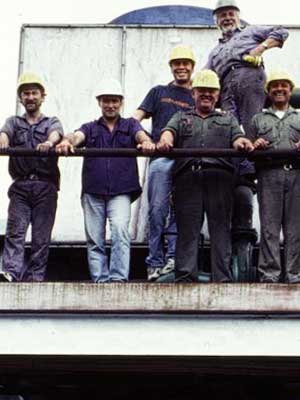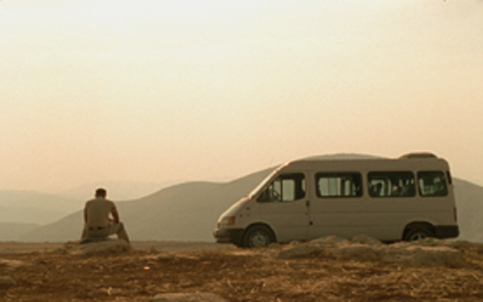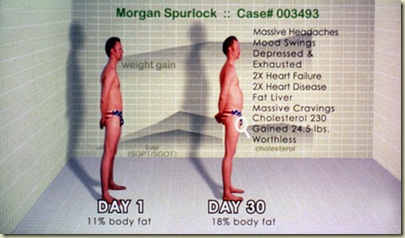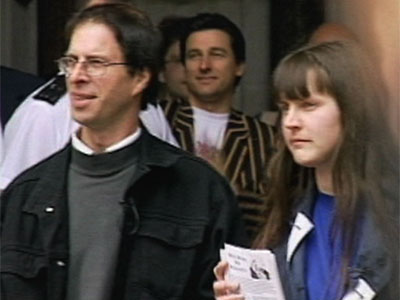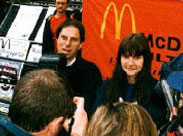From the Chicago Reader (May 7, 2004). — J.R.
Ford Transit
*** (A must-see)
Directed by Hany Abu-Assad
Written by Abu-Assad and Bero Beyer.
Super Size Me
* (Has redeeming facet)
Directed and written by Morgan Spurlock.
What do we expect from documentaries? Do we seek to be informed by them or merely entertained? If it’s the former, do we expect some guidance about how to process the information?
The documentaries I’ve seen lately have made me ponder these questions. For example, last week at the Buenos Aires Festival of Independent Film I saw a fascinating Palestinian feature called Ford Transit (showing twice this week at Facets Cinematheque) that freely mixes fiction and nonfiction as if they were alternate routes to the same goal. I also attended the world premiere of a more conventional documentary, The Take, which was made for Canadian TV and may never screen here. Finally, there’s Super Size Me (which opens at the Landmark this week), a film that has been getting considerable attention since it premiered at the Sundance festival last January.
Let’s start with The Take, which was directed by Avi Lewis and written by Naomi Klein, who’s a columnist for the Nation and the Guardian and author of the international best seller No Logo, a journalistic account of the worldwide antiglobalization movement. The film chronicles how laid-off workers in Argentina have taken over some 200 closed factories and started them up again as leaderless co-ops, with every worker receiving the same salary. Some of my leftist colleagues have criticized the film for its utopian idealism, which extends to describing the country’s current social climate as prerevolutionary. They may be right about the filmmakers’ naivete, but I was fascinated to learn of this new form of labor activism.
The takeovers, which stand in vivid contrast to defeatist responses to downsizing in this country, are a good example of a creative use of anger that makes the cultural climate of Argentina seem volatile and energizing instead of depressing, despite the country’s poverty. And while Lewis and Klein aren’t blind to the contradictions and anomalies of the movement — they interview a co-op worker who recently voted for the neoconservative Carlos Menem, which is a bit like an American union worker supporting Bush — they’re primarily interested in the inspirational potential of the story, as an object lesson for the rest of the world. For me that’s justification enough: anticapitalist propaganda that persuades and uplifts is in short supply these days.
Much more common, and more comforting to some, is the kind of documentary critic Dave Kehr once called the feel-good atrocity film. He was referring to Michael Moore’s Roger & Me, but the term fits any comic documentary designed to confirm our preconceptions about how rotten things are. Super Size Me is a new entry in the genre. It’s entertaining as well as frightening, but the less cynical Ford Transit is ultimately more stimulating. The latter was directed by Hany Abu-Assad, whose earlier fiction feature Rana’s Wedding was praised by J.R. Jones and is also playing at Facets this week. Ford Transit focuses on the driver of a minibus taxi transporting people — mainly Palestinians, but also a few Israelis — from one checkpoint to the next in Ramallah and Jerusalem. The film transparently resorts to fiction on occasion, and even much of the documentary material appears to have been set up or generated specifically for the camera. But it’s no less evident that everything the director and subject of Super Size Me says and does is motivated by the fact that he’s making a movie.
If the American film is more clearly a documentary, does that necessarily make it “truer” than the Palestinian one? I don’t think so, even though Ford Transit reminds me of an old-style TV variety show: we get a little bit of everything from the diverse occupants of the minibus, ranging from blasts of Arab pop music to sound bites from psychologists and sociologists to jokey asides from the driver. Most surprising of all, just about everything we hear, including the discussions about terrorism, sounds humane, measured, and reasonable, which in a movie about the West Bank may border on the miraculous. In this respect alone, it offers a striking and welcome alternative to the way that part of the world typically gets represented to us in the press.
As the most widely seen and profitable documentary ever made, Bowling for Columbine has helped create a whole new market for nonfiction films, so it was only a matter of time before we started to see imitation Michael Moores sprouting up.
Morgan Spurlock spent a month eating McDonald’s food and, with a slew of doctors monitoring him, filmed the gruesome results. Spurlock is 16 years younger than Moore, considerably neater and trimmer in appearance, and doesn’t present himself as an old-style radical. He hails from West Virginia, not Michigan, and though he records himself trying unsuccessfully to arrange meetings with a corporate spokesperson, he doesn’t make as big a production of it as Moore does in his documentary features. The main thing he borrows from Moore’s style of muckraking is a cheerful smirkiness, a way of simultaneously playing the fool and showing how wised-up he actually is behind the jokey facade. (It’s not wholly unrelated to President Bush’s just-plain-folks act, even if Bush uses it for different ends.)
As a filmmaker Spurlock is as indifferent to aesthetics as Moore. He recognizes that, given the dominant TV paradigm, personality and primitive content matter more than visual texture and doesn’t shy away from matching footage of a corpulent diabetic undergoing stomach surgery with the strains of the “Blue Danube” Waltz. Though the film treats obesity as an offense against nature, the hideous blotchiness of digital video blown up on 35-millimeter film isn’t supposed to be an offense against anything, and may even be brandished as a sign of authenticity.
In spite of all their posturing, I have to admit that I endorse the causes of both Moore and Spurlock and enjoy their irreverent social criticism. When friends of mine scoff at Bowling for Columbine because of Moore’s rampant self-infatuation, my standard response is, What’s more important in the final analysis — this country’s gun problem or Michael Moore’s ego? But I don’t expect Super Size Me will change my life beyond motivating me to reduce my already limited Big Mac intake. And even though the film does a fair job of sketching out the health hazards of fast food, it’s lazy about exploring alternatives; all it requires is that we nod when a talking head tells us that problem kids who switch to a well-balanced diet behave and perform much better than those who keep eating junk. (We’re shown those well-nourished kids at school, and sure enough, they aren’t shooting one another.) And when Spurlock talks about how despondent his diet makes him, we’re probably not supposed to consider the possible psychosomatic and commercial aspects of his depression: ultimately it’s in his movie’s interest to feel as lousy as possible.
For a really effective anti-McDonald’s polemic, I much prefer Franny Armstrong’s 53-minute McLibel: Two Worlds Collide (1997), which can be accessed for free online at www.mclibel.com. In 1986, two young London environmentalists and social activists — a barmaid named Helen Steel and a former postal worker named Dave Morris — put out a leaflet charging McDonald’s with false advertising, causing third world poverty, selling unhealthy food, exploiting workers and children, torturing animals, and destroying the Amazon rain forest. McDonald’s, which had already used Britain’s harsh libel laws to silence more than 50 critics in the 80s, filed suit against the two. The trial — the longest in English history — ended up costing the corporation 16 million pounds. Relying on donations, Steel and Morris defended themselves without the help of lawyers. They lost the case but won a clear moral victory: the judges ruled that most of their charges were accurate and fined them just 40,000 pounds, which McDonald’s, fearful of more bad publicity, didn’t even bother to collect.
Armstrong’s absorbing chronicle — which includes reenactments of parts of the trial directed by Ken Loach (who worked pro bono) — is another work of inspirational anticapitalist propaganda. It has the merit of challenging McDonald’s on a lot more than its food, and also shows what can be done about corporate abuses other than making funny movies about them. Super Size Me never gets that far. Spurlock’s diet is really more of a career move than a protest, and if it spurs action it will only be on a personal, individual level. In a way it functions as the mental, emotional, and aesthetic equivalent of junk food; two hours after you see it, you’re hungry again, even though your brain has gotten fatter.



